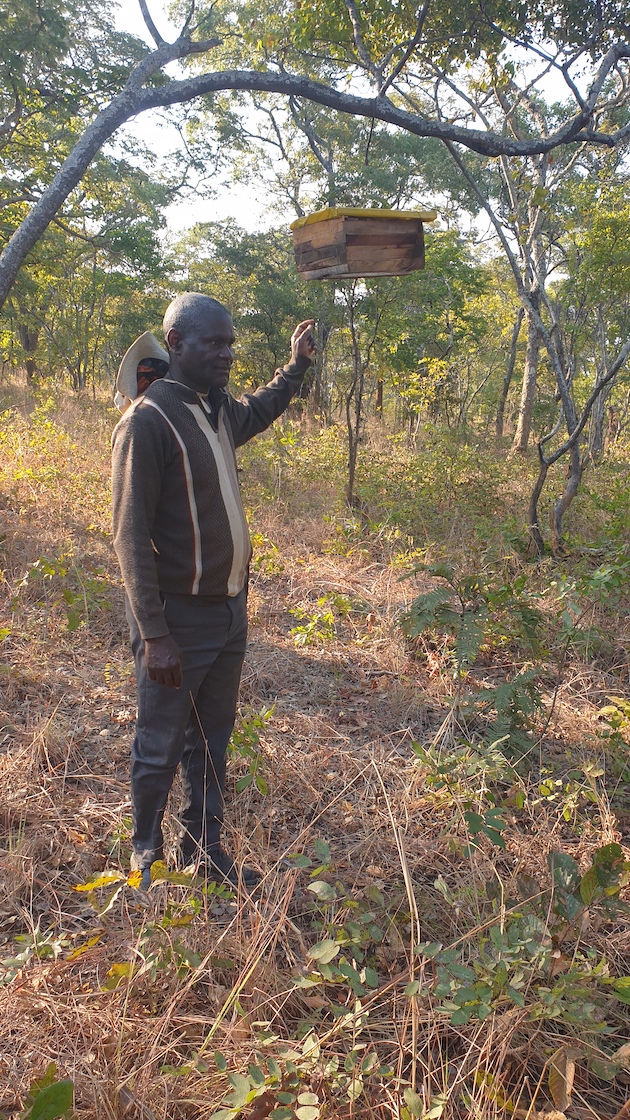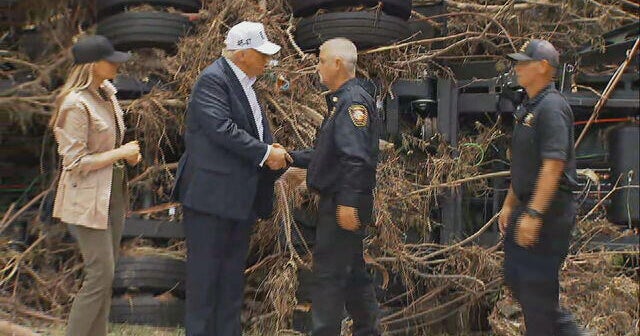by Charles Mpaka (chipata, zambia)Wednesday, November 01, 2023Inter Press Service
CHIPATA, ZAMBIA, Nov 01 (IPS) – As we method the forest within the village to understand Andrew Mbewe’s beekeeping enterprise, a bee from a hive near the sting of the pure woodland stings him on the cheek.
He steps again rapidly, waving everybody away from hazard, as he grimaces and grumbles in ache whereas making an attempt to take out the stinger to stop his face from swelling.
“That’s one of many duties they’re performing,” he says via his gritted tooth about his 18 beehives on this forest.
He examines the guidelines of his index and thumb fingernails to see if he has taken out the bee’s poison-injecting barb.
“These bees are guardians of this forest,” he says. “They shield it from invaders. That’s one of many causes this forest continues to be standing at present.”
Throughout the villages alongside the Chipata-Lundazi street, which cuts via a panorama that stretches between Kasungu Nationwide Park in Malawi and Lukusuzi and Luambe Nationwide Parks in Zambia’s Jap Province, one function is prone to catch the attention: spectacular stands of pure forests amongst villages and smallholder farms.

In Mbewe’s village in Chikomeni chiefdom in Lundazi district, these indigenous forests are dwelling to over 700 beehives belonging to greater than 140 households.
The forest safety obligation that the bees are offering is an unintended consequence of the beekeeping enterprise. Basically, the communities are sucking cash out of the honeycombs in these beehives via gross sales of each uncooked and processed honey, a few of which discover area on the cabinets of Zambia’s supermarkets.
It is without doubt one of the livelihood actions which Group Markets for Conservation (Comaco), in partnership with the Worldwide Fund for Animal Welfare (IFAW), are implementing inside the broader wildlife conservation technique within the Malawi-Zambia panorama.
Comaco’s driving drive is that conservation can work when rural communities overcome the challenges of starvation and poverty.
It says these issues are sometimes associated to farming practices that degrade soils and drive deforestation and biodiversity loss.
Subsequently, Comaco works with small-scale farmers to undertake climate-smart agriculture approaches corresponding to making and utilizing natural fertilisers and agroecology to revitalise soils so farmers obtain most crop productiveness.
It additionally helps small farmers so as to add worth to their produce and attractively model the merchandise so they’re aggressive available in the market.
With burgeoning carbon buying and selling as one other income stream, this wildlife economic system is raking in promising sums for each particular person members and their teams, communities say.
The cooperative to which Mbewe belongs has used a part of its income to buy two autos – 5-tonne and 3-tonne vehicles – which the group hires out for revenue. The cash is invested in group initiatives corresponding to constructing lecturers’ homes and hospital shelters.
Luke Japhet Lungu, assistant mission supervisor for the IFAW-Comaco Partnership Challenge, tells IPS that these actions are making folks much less and fewer reliant on exploiting pure sources for a residing.
“You’ll not discover a bag of charcoal right here,” Lungu challenges.
“Due to the farming practices we adopted, persons are realising that in the event that they destroy the forest, additionally they destroy the productiveness of their land and their revenue will endure,” he says.
Alongside the way in which, persons are additionally studying to stay with the animals.
“Animals are capable of transfer from one forest to a different with out disturbance. For the larger ones, corresponding to elephants, which might trigger injury to our crops, we now have a speedy communication system via our group scouts who work with authorities rangers.
“We now have events of elephant invasions from the three parks. Nonetheless, we now have learnt to deal with them higher to minimise battle. It’s a course of,” Lungu says.
One man who has learnt to handle the animals he as soon as hunted is Mbewe himself.
A battle-scared poacher for practically a decade from the Nineteen Eighties, he terrorised the 5,000-square-kilometre conservation space on poaching missions.
For his operations, he used rifles he rented from some officers inside the authorities of Zambia, he claims.
“They had been additionally my main marketplace for ivory and different wildlife merchandise,” he says.
Apparently, with out realizing it, Mbewe was truly supplying a far greater transnational market.
For over 30 years, from the late Seventies, the Malawi-Zambia conservation space was a serious supply and transit route for ivory to markets in China and Southeast Asia.
Elephant poaching rocked the panorama ensuing within the decline of the species. In Kasungu Nationwide Park, for instance, in response to knowledge from the Division of Nationwide Parks and Wildlife in Malawi, elephant numbers dwindled from 1,200 within the Seventies to only 50 in 2015.
In 2017, IFAW launched a five-year Combating Wildlife Crime mission whose intention was to see elephant populations stabilise and improve within the panorama via decreased poaching.
The mission supported park administration operations and constructed or rehabilitated requisite constructions corresponding to car workshops and places of work.
It educated sport rangers and judiciary officers in wildlife crime investigation and prosecution.
It supplied sport rangers with uniforms, respectable housing, discipline allowances, patrol autos and tools.
It supported group livelihood actions corresponding to beekeeping and climate-friendly farming.
It additionally thrust communities to the centre of planning wildlife conservation measures.
Erastus Kancheya is the Space Warden for the Division of Nationwide Parks and Wildlife for the East Luangwa Space Administration unit the place Lukusuzi and Luambe Nationwide Parks lie.
He says he sees these measures as enabling degraded protected areas like Lukusuzi Nationwide Park to “rise from the long-forgotten mud awakening on the lengthy street of significant conservation”.
Kancheya says participating communities in co-management of the protected areas can also be proving to be efficient within the panorama.
Now, IFAW is leveraging this group partnership to maintain the achievements of the Combating Wildlife Crime mission via its flagship Room to Roam initiative.
Patricio Ndadzela, Director for IFAW in Malawi and Zambia, describes Room to Roam as a broad, people-centred conservation technique.
“That is an initiative that cuts throughout land use and planning, promotes climate-smart approaches to farming and ensures folks and animals co-exist,” he says.
The method goals to ship advantages for local weather, nature and other people via biodiversity safety and restoration.
Room to Roam intends to construct landscapes by which each animals and other people can thrive.
Within the course of, some persons are being reworked. Mbewe is one such particular person. From being a infamous poacher, he’s now a ploughshare of conservation as chairperson of the Group Forest Administration Group in his space. The cooperative enforces wildlife conservation and sustainable land administration practices.
It isn’t straightforward work, he admits.
“There are hardened attitudes to alter, and endurance is required to show. Typically, the earnings from the livelihood actions are inadequate or irregular. For example, you don’t harvest honey each day or each month,” he says.
But, he says, the prospects are good and the challenges he faces now rank nowhere close to what he encountered when he was a poacher.
One incident nonetheless makes him shudder: Stalking a herd of elephants at their ingesting spot in Kasungu Nationwide Park at some point, he got here beneath surprising gunfire from rangers.
“I used to be an skilled poacher. I knew at what time of the day to search out the elephants and at what location. However the rangers noticed me first. I used to be lifeless. I don’t perceive how I escaped,” he says.
As we speak, on reflection, he regrets having ever lived the lifetime of a poacher.
“I went into poaching for egocentric causes,” Mbewe says thoughtfully.
“Poaching was benefiting me solely; the conservation work I’m doing now’s benefiting all the group and future generations,” he tells IPS whereas rubbing the spot of the bee sting and searching relieved.
IPS UN Bureau Report
Comply with @IPSNewsUNBureauFollow IPS Information UN Bureau on Instagram
© Inter Press Service (2023) — All Rights ReservedOriginal supply: Inter Press Service
The place subsequent?
Newest information
Learn the most recent information tales:
Communities Taking a Sting Out of Poaching With Various Livelihoods Wednesday, November 01, 2023The Killings in Gaza Ought to Stain Our Ethical Conscience Wednesday, November 01, 2023Even Wealthy Nations Now Apprehensive About ISDS Wednesday, November 01, 2023UPDATED: Israel-Palestine disaster: UN welcomes first medical evacuations from Gaza Wednesday, November 01, 2023Can Creativity Change the World? Tuesday, October 31, 2023Girls Appropriate Historic Injustices, Construct Local weather Resilience By means of Money Pooling Tuesday, October 31, 2023COVID-19 Vaccine Hesitancy: Sharing ‘Actual-Time’ Information, Constant, Easy Messaging Helps Tuesday, October 31, 2023Biden Is a Genocide Denier and Enabler in Chief for Israel’s Ongoing Struggle Crimes Tuesday, October 31, 2023Girls and Struggle Tuesday, October 31, 2023Bangladesh, Maldives, DPR Korea make ‘large’ strides towards illness elimination Tuesday, October 31, 2023
Hyperlink to this web page out of your website/weblog
Add the next HTML code to your web page:
<p><a href=” Taking a Sting Out of Poaching With Various Livelihoods</a>, <cite>Inter Press Service</cite>, Wednesday, November 01, 2023 (posted by International Points)</p>
… to provide this:
Communities Taking a Sting Out of Poaching With Various Livelihoods, Inter Press Service, Wednesday, November 01, 2023 (posted by International Points)








